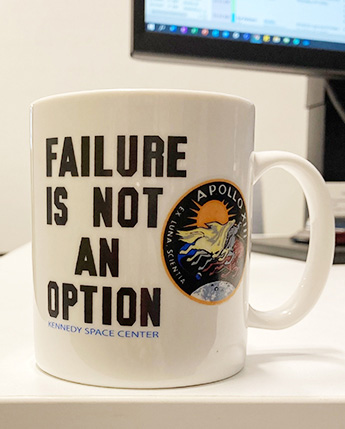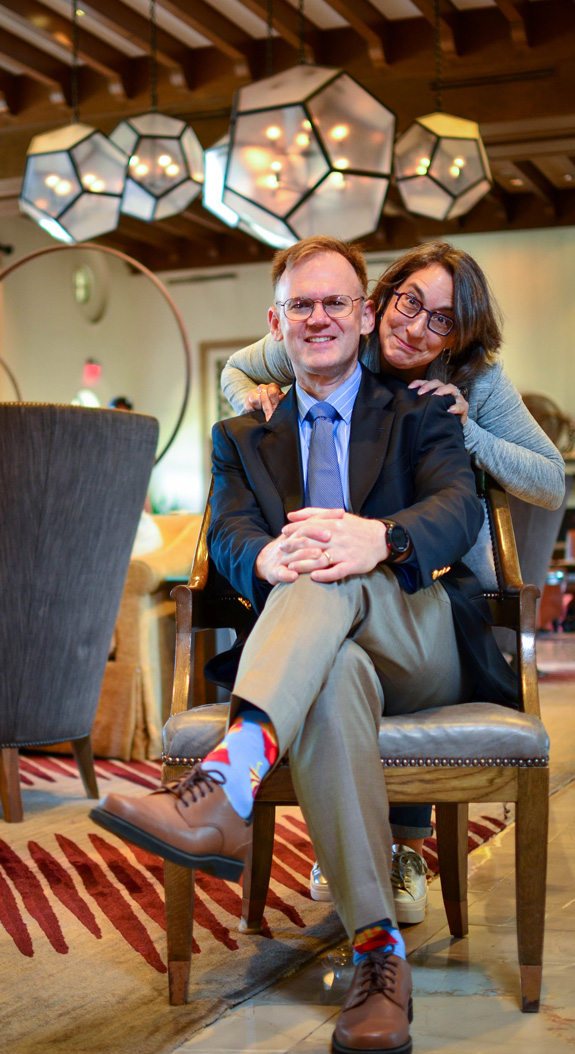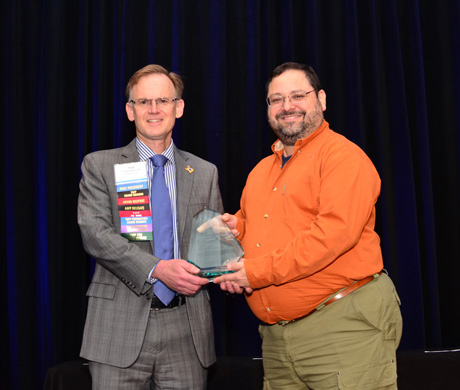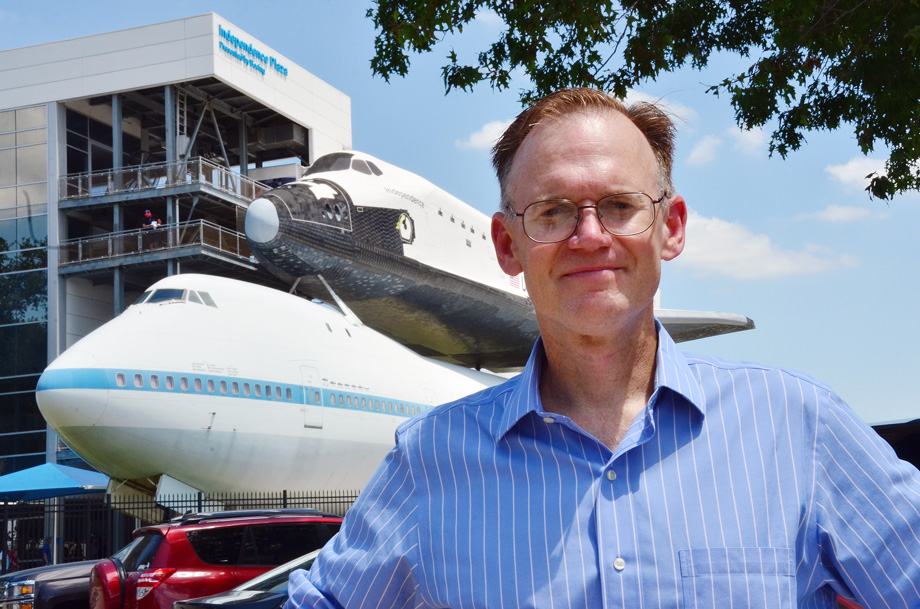Failure is not an option
Troy Fiesinger, MD, Texas Family Physician of the Year, 2021-22
Story by Samantha White, photos by Jonathan Nelson
Growing up in the southeast suburbs of Houston meant Troy Fiesinger, MD, was raised with neighbors who were mostly engineers and actual NASA astronauts. He also comes from a long line of engineers, including his father who moved to Texas to be a petrochemical engineer for Monsanto. By the time he became a family physician, there hadn’t been a doctor in the family for over 100 years.
“I’m the black sheep,” Fiesinger says. “My father never said I should do this or that, he said basically that when you graduate you should be in school or out of the house, and you should probably have a job. There was never pressure, they left things wide open.”

After graduating cum laude from Duke University, Fiesinger returned home to Texas to attend Baylor College of Medicine for medical school. It was here where he narrowed his specialty choice – first from oncology to obstetrics, then to internal medicine, then finally to family medicine. His mother fought and beat colon cancer when he was a teenager, and the relationship his family built with her MD Anderson oncology team initially led him toward a career in cancer research. But the wide range of patients and problems offered by family medicine was the shiny object Fiesinger couldn’t ignore.
“I chose family medicine because I liked variety,” Fiesinger says. “I think of family medicine as ‘what’s behind door number three?’ I like not knowing what’s behind that door.”
Once family medicine was his clear career path, Fiesinger headed back to North Carolina to complete his family medicine residency at East Carolina University. The university medical center there was in a rural area, which he felt would offer a unique opportunity to settle into the life of a family physician. After completing residency though, the Lone Star State called him back. He returned to Texas, this time for good, to practice at Scott and White in Waco.
Houston, we have a teacher
Fiesinger spent seven years as a clinical physician with Scott and White before he felt he had mastered the skills of family medicine enough to teach the next generation full time. “One of the things I find most enjoyable about being a doctor is teaching patients,” Fiesinger says. “I love explaining things. So I always wanted to try my hand at teaching.” He was given the opportunity to test the teaching waters at Scott and White, teaching Texas A&M medical students how to apply their basic scientific knowledge to patients with high blood pressure, diabetes, and high cholesterol. After enjoying that for a while, Fiesinger took the leap to a faculty position, first at the Conroe Family Medicine Residency Program, and later at the Memorial Family Residency Program in Sugar Land. He was back in his old stomping grounds once again.

In her nomination letter, a colleague of Fiesinger’s, Lindsay Botsford, MD, MBA, talked about how inspirational Fiesinger still is to the next generation of family physicians. “He was a skilled teacher of practice management and quality for the residents, often coming up with interactive and meaningful ways to teach principles that don’t fit neatly in lectures,” Botsford said. “He designed and spearheaded a resident quality bonus program, created to teach principles of quality measurement by doing.”
After spending a decade in academic medicine, Fiesinger was ready for a change and a chance to be part of something more innovative than academia. This is when he entered the world of Village Medical, where he currently works as both a practicing physician and an administrator. His administrative duties include serving as Medical Director of their house call and post-hospital discharge programs, as well as the care management department. Since his start with Village, Fiesinger has perfected the clinical/administrative balance that allows him to not only use both sides of his brain, but also avoid burnout, something he knows he is susceptible to. Numerous nomination letters mentioned his “unique skill set” regarding his ability to practice clinically, treating patients and maintaining strong patient relationships, all while functioning in his administrative roles.
“The way I think of it is after a day of patients, I really want to look at the big picture and think about all the problems that need to be solved,” Fiesinger says. “And after a day of meetings I want to get back to the clinic and just help one person. After a day of meetings and realizing everything is going to take six months, and you’ve done a lot of politicking, you realize you just want to go and help a person.”
Failure is not an option
While he enjoys teaching in any capacity, Fiesinger’s love of learning is even stronger. He saw “Apollo 13” with his mom, who was interested in the movie because she personally knew some of the astronauts involved in the mission. That led him to read Gene Kranz’ book, “Failure is Not an Option.” Kranz was an aerospace engineer at NASA during the Apollo program and was tasked with writing a manual for mission control. There were no protocols, no basic instructions to use as a starting point. Kranz had to figure out how mission control would direct a lunar landing, while another team simultaneously figured out how NASA would land the astronauts themselves on the moon, an idea that struck Fiesinger. Kranz’ role in the Apollo missions was an inspiration to Fiesinger, and not entirely unlike the daily life of a family physician.
“That’s what I really enjoy doing in my roles now as a family doctor,” Fiesinger says. “Throw me a problem and I’ll figure out how to attack it. I’ll figure out a process. I’ll write you a manual.”
And he’s done so a number of times. Despite being “20 years behind” on what he knew about COPD, Fiesinger caught up on the disease, then created a treatment protocol that became a national program that has reduced COPD-related admissions by as much as 40%. Botsford spoke of the program in her nomination letter, calling Fiesinger a “thought leader and innovator.” Similarly, VillageMD Co-Founder and Chief Medical Officer Clive Fields, MD, says Fiesinger is inspiring. “Leading the Village Care Management team, Troy has designed and implemented programs that have improved the physician and patient experience while driving down hospital and specialty utilization,” Fields said.
“That sense of possibility is I think what I liked about it,” Fiesinger says of Village. “We have an unspoken rule that you will not get punished for failing. We want you to try and fail. Failing is okay as long as you keep trying.”
Being open to new experiences is key to learning, according to Fiesinger. He lives by the notion that whatever you explore and learn will eventually pay off, and that learning skills in one area of life can inform a completely different area. “Everything you learn matters,” he says. This rings especially true for the twists and turns his career has taken. He says he wouldn’t be the physician leader he is today had he not practiced full-scope family medicine. Working in a federally qualified health center set him up for taking care of patients with little resources, something he’s had to do time and time again throughout his career. You’ve got to be willing to see the lessons in everything.
If learning is Fiesinger’s favorite thing to do, innovating is his second favorite. His least favorite phrase is “that’s how we’ve always done it.” He believes there is not a process out there that can’t be improved, and he enjoys doing the improving. He has had numerous opportunities to do so since joining Village almost seven years ago. The first year was a challenge, because the team had a great idea but hadn’t quite figured out how to execute it. After making all the possible mistakes in modernizing a medical office and opening new practice after new practice, Fiesinger says they were successful because they didn’t give up. They just kept going for it and trying things.
“That sense of possibility is I think what I liked about it,” Fiesinger says of Village. “We have an unspoken rule that you will not get punished for failing. We want you to try and fail. Failing is okay as long as you keep trying.”
Trying and failing was a must in order to bring their vision of value-based primary care to fruition. In Fiesinger’s words, a value-based care model like the one Village uses allows family doctors to take care of patients the way they always have and gives them the tools they need to provide the highest quality care, all while being rewarded appropriately. He calls the model a “game changer,” allowing docs to finally do all the things they’ve wanted to but didn’t know how to pay for. And it’s certainly a team sport.
“You have to clinically integrate with your fellow primary care physicians and specialists,” Fiesinger says. “You need to partner with labs, with hospitals, to take care of patients in a high-quality, cost-effective way. Because none of us can do this work alone. We all need each other to succeed.”
Fiesinger says that Village partners with hospitals they share values with, as well as Walgreen’s since it would be much more difficult for Village to scale up and run pharmacies nationally on its own. It’s this type of teamwork that allows Village to take care of tens of thousands of patients using referrals to specialists, home health, etc. “If you can control all those costs you can really do amazing things,” Fiesinger says, “and provide far better care than those patients get when all those things are broken apart and split up, controlled by people who are trying to run a profitable business and not working together.”
Ask not what your country can do for you
Fiesinger’s love for innovating is something he no doubt inherited from his engineer father, who spent time at the Capitol working with the Texas Chemical Council to better the chemical industry. Having civically engaged parents who drove home the significance of voting piqued Fiesinger’s interest in politics at a young age. His father always told him if he didn’t vote, he wasn’t allowed to complain, and well, he has complaints.

He sees getting involved in organized medicine as a way to make sure his voice and his patients’ voices are being heard. He wants to be involved in solving the problems he sees day in and day out as a clinical physician. He has testified at the Legislature numerous times on behalf of TAFP and similar organizations, and attends lobbying days when he’s available. He worked his way through the TAFP leadership track on a schedule that would allow his year as TAFP President to coincide with a legislative session. During that year, he traveled to as many corners of Texas as he could, focusing on places that hadn’t received as much attention from the Academy in recent years. He felt it was important to stand where those docs stood, seeing their experiences and circumstances with his own eyes. He wanted to know what they were dealing with when he visited the Capitol to advocate for the specialty.
Fiesinger tells a touching story about running in to his dad at the Capitol during a lobbying day, not knowing they were both in Austin working to advocate for their respective industries. It seemed as though staffers all over the Capitol knew his dad because of the hard work he did there, many of them telling stories about their experiences with him.
He takes enormous pride in the fact that he helped his dad vote absentee in the 2016 election, just before he passed away. “I was bound and determined to make sure he did not miss that last election,” Fiesinger says. “I will be forever proud that I helped make that happen. He voted from his hospital bed right before he went on hospice.”
Fighting for the specialty of family medicine is important to Fiesinger, and something he encourages other physicians to do. “We need a lot of voices,” he says. “And a lot of voices need to be heard to be successful because there’s no one family doctor, there’s no one patient. I want to help doctors who are struggling or are in pain, I want to help our patients. To do that, you have to be vocal and active within your organization, within the medical society, your government, and your community. All those things are critical to being happy and successful as a family physician.”
Also critical to Fiesinger’s personal happiness are his family life and hobbies. His wife Ellen just completed her doctorate degree in public health and works as a family nurse practitioner. Her current project has her working with international refugees resettling in Houston. They recently became empty nesters, with two children currently in college. He and Ellen are into cycling, riding as well as attending large cycling races across the world, even attending the Tour de France for their honeymoon. Earlier this year they travelled to France and Belgium to watch several of Europe’s most famous bicycle races from the side of the road.
One small step for man, one giant leap for family medicine
When reminiscing about his career as a family physician in varying capacities, Fiesinger continuously returns to his NASA-adjacent upbringing. The idea that so many highly educated people moved from all across the country to a little suburb outside of Houston to build rockets and put people on the moon has always mesmerized him. It symbolizes possibility to him. “No one told them they couldn’t do it,” he says. “They put a person on the moon and didn’t know how they were going to do it, but just figured it out.”
This “possibility” is inspiration for Fiesinger. Inspiration to do his best for his team, for his patients, and for his specialty. To work hard to solve the big problems in his city, his state, and his country, while simultaneously working hard to treat his patients in the exam room.
Last spring Fiesinger competed in a cycling race where for miles and miles he thought he was in dead last place. He was riding all by himself in the middle of rural farmland, assuming the race ended and he would soon be dropped. But he kept riding his bike. Eventually he caught up to enough people to finish the race in the middle of the pack, taking 17th place. A true testament to his ability to keep going.
“Just keep going,” Fiesinger says. “Even when you think you’re in last.”
